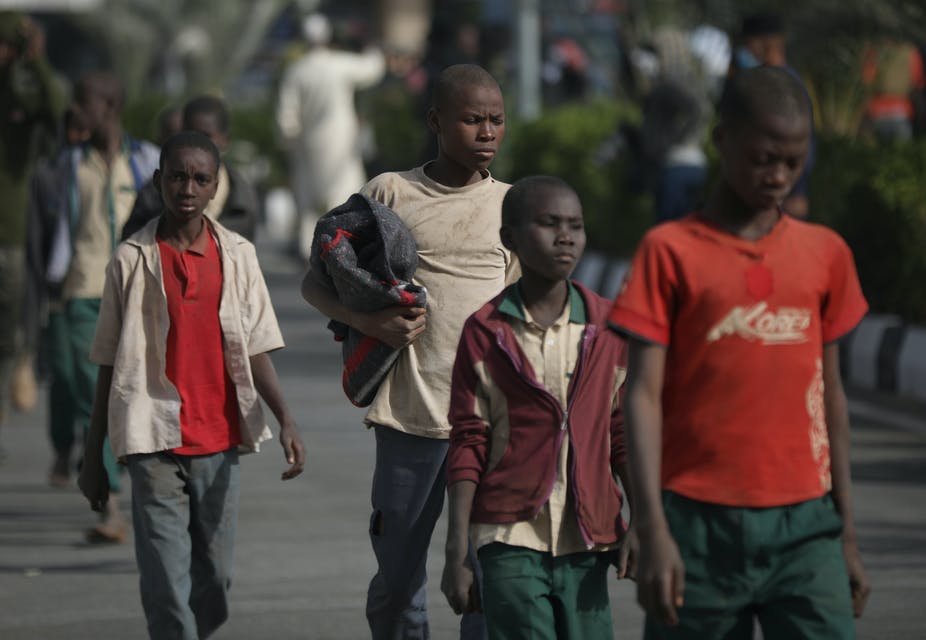Nigeria: why do children keep getting kidnapped?

A group of boys abducted by Boko Haram in Katsina State, northern Nigeria, after their release in December 2020. EPA
Gemma Ware|
Editor and Co-Host, The Conversation Weekly Podcast
In this episode of The Conversation Weekly, insurgent groups in northern Nigeria continue to kidnap schoolchildren as the government struggles to protect communities against militants such as Boko Haram. And we speak to a researcher who has interviewed Kenyan women about why they joined the militant Islamist group Al-Shabaab.
Nigeria is gradually becoming one of the most dangerous places to live. The 2020 Global Terrorism Index identified the country as the third most affected by terrorism. There was a sharp increase in Boko Haram’s targeting of civilians by 25%, and killings by herdsmen increased by 26%, compared with the previous year.
According to the Nigeria Security Tracker, 2,769 violent deaths were recorded between February 2020 and February 2021 in Borno State alone. Similarly, ransom-kidnapping by armed groups has increased substantially in the past five years. Over US$18 million (£13 million) was paid as ransom for kidnapped victims between 2011 and 2020.
While insecurity is common in Nigeria, the northern region has been most affected. This is due to Boko Haram attacks, banditry, farmers-herdsmen conflicts, kidnappings and ethno-religious conflicts. Sadly, children have not been spared.
In the north-east, children have been murdered, abducted and used as sex slaves, forcefully recruited as child soldiers, and suffer from diseases and malnutrition at the internally displaced persons camps.
We speak to two experts about the situation, and why children are the prime targets of armed groups. Hakeem Onapajo, senior lecturer in the Department of Political Science and International Relations at Nile University in Nigeria, explains that Boko Haram targets children for use as slaves in its camps, including girls as sex slaves. “They can also use that to negotiate for some ransom in order to fund their operations,” he tells us, and for the release of militants from prison.
Despite setting up a joint task force to fight Boko Haram in the north-east, the Nigerian government has made little headway on improving the security situation. Samuel Okunade, a post-doctoral fellow at the University of Pretoria, laments that this has left communities to fend for themselves. “When the lives of your citizens are not being protected, then people will lose trust in your government,” he tells us.
And in our second story, we cross the continent to Kenya to hear about women who joined the Islamist militant group, Al-Shabaab. From its base in Somalia, where the group controls much of the countryside and remains in a violent stalemate with the government, it continues to carry out terrorist attacks in the region and to recruit across the border in Kenya.
Women and girls are used to recruit others, as logistics planners and as spies for terrorist activities within Kenya. Fathima Azmiya Badurdeen, lecturer in the Department of Social Sciences at the Technical University of Mombasa in Kenya, has been interviewing women who have since left Al-Shabaab about their experiences and why they joined the group. Some joined willingly, and others were forcibly recruited, but the line between voluntary and involuntary is often blurred. Badurdeen explains what she’s found about the circumstances behind women’s decisions to join Al-Shabaab, and what this means for their rehabilitation.
And Bryan Keogh, business editor at The Conversation in New York, gives us his recommended reads.
The Conversation Weekly is produced by Mend Mariwany and Gemma Ware, with sound design by Eloise Stevens. Our theme music is by Neeta Sarl. You can find us on Twitter @TC_Audio, on Instagram at theconversationdotcom. or via email on [email protected]. You can also sign up to The Conversation’s free daily email here.
News clips in this episode are from Aljazeera News, VOA News, CGTN News, CGTN Africa, euronews, DW News, Reuters, CNN News, RT News, africanews, Arise News, TVC News Nigeria, and KBC Channel 1.
Published with permission from The Conversation under a Creative Commons License.


